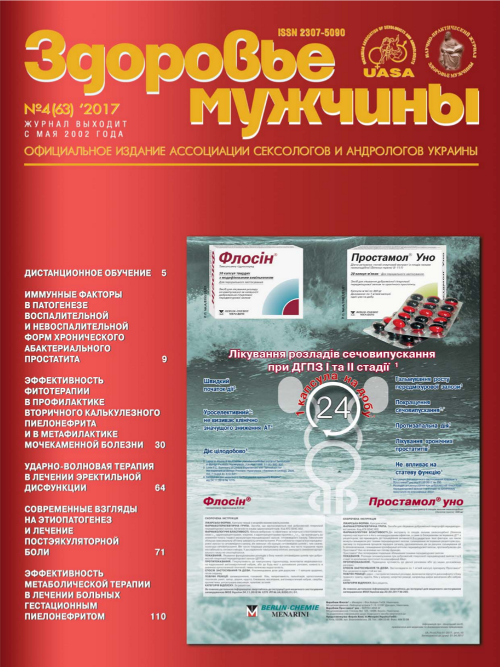Efficiency of phytotherapy in preventing exacerbations of secondary calculous pyelonephritis and metaphylaxis of urolithiasis
##plugins.themes.bootstrap3.article.main##
Abstract
The objective: to analyse the efficacy and safety of phytopreparation Canephron® N in order to prevent exacerbations of secondary chronic calculous pyelonephritis and metaphylaxis of urolithiasis (MU).
Materials and methods. An open monocentric comparative study in which took part 60 patients with MU and secondary chronic calculous pyelonephritis. The age range of patients was from 28 to 70 years (mean age – 46.3 ± 2.6 years). There were 24 men (40.0%) and 36 women (60.0%). All patients who were included in the study, on the eve had removal of stones and treatment of pyelonephritis. In order to metaphylaxis of MU and prevention of exacerbation of the secondary chronic calculous pyelonephritis on the basis of a random sample patients were divided into two groups. Patients of the main group (n = 30) received Canephron® N 2 pills or 50 drops 3 times a day for 3 months. Patients of the second group (n = 30) took a phyto tincture «Renal» 50 ml 3 times a day for 3 months.
Results. Analysis of patients monitoring results shows that the use of Canephron® N for 3 months after the removal of stones and treatment of secondary chronic calculous pyelonephritis significantly reduces the frequency of recurrences of chronic calculous pyelonephritis and formation of recurrent kidney stones.
Conclusion. Canephron® N has no side effects, is well tolerated by patient. And can be recommended for use in preventing formation of recurrent concrements and exacerbations of secondary chronic calculous pyelonephritis.
##plugins.themes.bootstrap3.article.details##

This work is licensed under a Creative Commons Attribution 4.0 International License.
Authors retain the copyright and grant the journal the first publication of original scientific articles under the Creative Commons Attribution 4.0 International License, which allows others to distribute work with acknowledgment of authorship and first publication in this journal.
References
Возіанов С.О. Ресурси та основні показники діяльності урологічної служби України за 50 років / С.О. Возіанов, Н.О. Сайдакова, Л.М. Старцева // Урологія. – 2015. – No 2. – С. 9–19.
Возианов А.Ф. Атлас: руководство по урологии: в 3 т. / А.Ф. Возианов, А.В. Люлько. – Днепропетровск: РИА «Днепр VAL», 2001. – 1905 с.
Дзеранов Н.К. Мочекаменная болезнь. Клинические рекомендации / Н.К. Дзеранов, Н.А. Лопаткин. – М.: Оврелей, 2007. – 296 с.
Мочекаменная болезнь: этиопатогенез, диагностика, лечение и метафилактика: пособие / В.И. Вощула [и др.]; под. общ. ред. В.И. Вощулы. – Минск: Зималето, 2010. – 220 с.
Современные тенденции в эпидемиологии, диагностике и лечении мочекаменной болезни / Э.К. Яненко, Д.С. Меринов, О.В. Константинова [и др.] // Экспериментальная и клиническая урология. – 2012. – No 3. – C. 19–24.
Факторы риска «идиопатического» кальций оксалатного нефролитиаза и пути противорецидивного лечения / Д.В. Черненко, В.В. Черненко, Н.И. Желтовская [и др.] // Здоровье мужчины. – 2015. – No 2. –
С. 129–133.
Borysewicz Sañczyk H. Urolithiasis risk factors in obese and overweight children / H. Borysewicz Sañczyk, T. Porowski, A. Hryniewicz // Pediatr Endocrinol Diabetes Metab. – 2012. – Vol. 18, No 2. – P. 53–57.
Dingermann T., Loew D. Urologika // Phytopharmakologie. – Stuttgart. Wiss. Verlagsgesellschaft Stuttgart, 2003. – Р. 250–258.
Knoll T. Epidemiology, Pathogenesis, and Pathophysiology of Urolithiasis / T. Knoll // Eur. Urol. Suppl. – 2010. – Vol. 9. – P. 802–806.
Naber K.G. Efficacy and safety of the phytotherapeutic drug Canephron® N in prevention and treatment of urogenital and gestational disease: review of clinical experience in eastern europe and central asia // Research and reports in Urology. – 2013. – No 5. – Р. 39–46.





